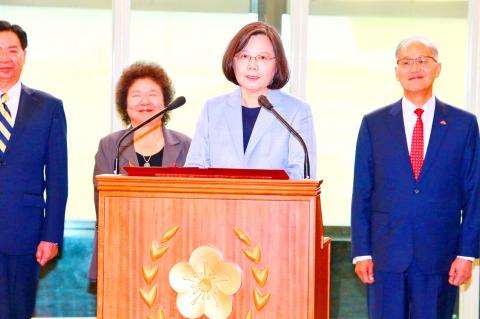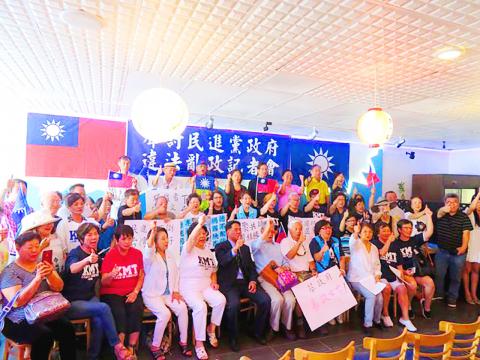President Tsai Ing-wen (蔡英文) left yesterday on a nine-day trip that is to take her to Paraguay and Belize, with stopovers in the US.
Tsai made a brief statement at Taiwan Taoyuan International Airport, saying that it is her duty as the president to conduct diplomacy on the nation’s behalf.
“In going abroad, the whole world can see Taiwan; they can see our nation as well as our support for democracy and freedom,” Tsai said. “We only need to be firm so that no one can obliterate Taiwan’s existence.”

Photo: CNA
Tsai said she has three messages to convey during her trip: Taiwan would congratulate its diplomatic allies and thank them for their time-honored friendship and support in the international arena; it would continue its development of ties with other nations; and her administration would strive to strengthen Taiwan and safeguard its free and democratic values.
Tsai was scheduled to arrive in Los Angeles at about noon yesterday and stay overnight before departing for Paraguay today; she is to transit through Houston, Texas, on her way home from Belize.
Many people will be watching to see if Tsai is treated differently during her transit stops or has more interaction with politicians than in the past, given that US President Donald Trump signed the Taiwan Travel Act into law in March.

Photo: CNA
The act allows high-level US officials to visit Taiwan and vice versa, in contrast to previous US policy that did not allow bilateral visits by Cabinet-level officials, but did allow Taiwanese presidents to transit through US cities on visits to third countries.
Tsai is to attend the inauguration of Paraguayan president-elect Mario Abdo Benitez on Wednesday as part of a three-day visit.
She is to fly to Belize on Thursday for a three-day visit, during which she is to be decorated by Governor-General Colville Young, visit Belizean Prime Minister Dean Barrow and give a speech to parliament.
Tsai is scheduled to leave Belize on Aug. 18 and make a 27-hour stopover in Houston before arriving home on Aug. 20.
Presidential Office Secretary-General Chen Chu (陳菊) is accompanying Tsai on the flight to Los Angeles, but is to stay in the US when Tsai heads for Paraguay.
Chen is to visit five US cities before she rejoins Tsai in Houston.
The Taiwan Center Foundation of Greater Los Angeles is organizing a welcoming party for Tsai, foundation chairman Alan Thian (田詒鴻) said on Saturday, adding the party is expected to draw more than 1,000 Taiwanese expatriates.
However, Chinese expatriate groups in the city said that they were mobilizing at least 500 people to demonstrate outside Tsai’s hotel and would rent an airplane to fly a banner reading “Only One China. Taiwan is a part of China” over central Los Angeles.
Foundation chief executive officer Lin Jung-sung (林榮松) said he believes that Chinese immigrants come to the US because they want to enjoy the US’ freedoms and democracy.
“It is quite strange that Chinese immigrants are focusing their outrage on Tsai, a democratically elected head of state, instead of protesting the unfree dictatorship in China,” he said.
Hsieh Tsung-huang (謝宗煌), a Chinese Nationalist Party (KMT) official at the party’s southwestern US chapter, on Saturday said that while the KMT disagrees with the policies of the Tsai administration, it has had no hand in the protests planned in the US.
“We do not collaborate with China to protest our own president,” he told a news conference organized with several pan-blue Taiwanese-American groups.

A magnitude 7.0 earthquake struck off Yilan at 11:05pm yesterday, the Central Weather Administration (CWA) said. The epicenter was located at sea, about 32.3km east of Yilan County Hall, at a depth of 72.8km, CWA data showed There were no immediate reports of damage. The intensity of the quake, which gauges the actual effect of a seismic event, measured 4 in Yilan County area on Taiwan’s seven-tier intensity scale, the data showed. It measured 4 in other parts of eastern, northern and central Taiwan as well as Tainan, and 3 in Kaohsiung and Pingtung County, and 2 in Lienchiang and Penghu counties and 1

FOREIGN INTERFERENCE: Beijing would likely intensify public opinion warfare in next year’s local elections to prevent Lai from getting re-elected, the ‘Yomiuri Shimbun’ said Internal documents from a Chinese artificial intelligence (AI) company indicated that China has been using the technology to intervene in foreign elections, including propaganda targeting Taiwan’s local elections next year and presidential elections in 2028, a Japanese newspaper reported yesterday. The Institute of National Security of Vanderbilt University obtained nearly 400 pages of documents from GoLaxy, a company with ties to the Chinese government, and found evidence that it had apparently deployed sophisticated, AI-driven propaganda campaigns in Hong Kong and Taiwan to shape public opinion, the Yomiuri Shimbun reported. GoLaxy provides insights, situation analysis and public opinion-shaping technology by conducting network surveillance

‘POLITICAL GAME’: DPP lawmakers said the motion would not meet the legislative threshold needed, and accused the KMT and the TPP of trivializing the Constitution The Legislative Yuan yesterday approved a motion to initiate impeachment proceedings against President William Lai (賴清德), saying he had undermined Taiwan’s constitutional order and democracy. The motion was approved 61-50 by lawmakers from the main opposition Chinese Nationalist Party (KMT) and the smaller Taiwan People’s Party (TPP), who together hold a legislative majority. Under the motion, a roll call vote for impeachment would be held on May 19 next year, after various hearings are held and Lai is given the chance to defend himself. The move came after Lai on Monday last week did not promulgate an amendment passed by the legislature that

AFTERMATH: The Taipei City Government said it received 39 minor incident reports including gas leaks, water leaks and outages, and a damaged traffic signal A magnitude 7.0 earthquake struck off Taiwan’s northeastern coast late on Saturday, producing only two major aftershocks as of yesterday noon, the Central Weather Administration (CWA) said. The limited aftershocks contrast with last year’s major earthquake in Hualien County, as Saturday’s earthquake occurred at a greater depth in a subduction zone. Saturday’s earthquake struck at 11:05pm, with its hypocenter about 32.3km east of Yilan County Hall, at a depth of 72.8km. Shaking was felt in 17 administrative regions north of Tainan and in eastern Taiwan, reaching intensity level 4 on Taiwan’s seven-tier seismic scale, the CWA said. In Hualien, the